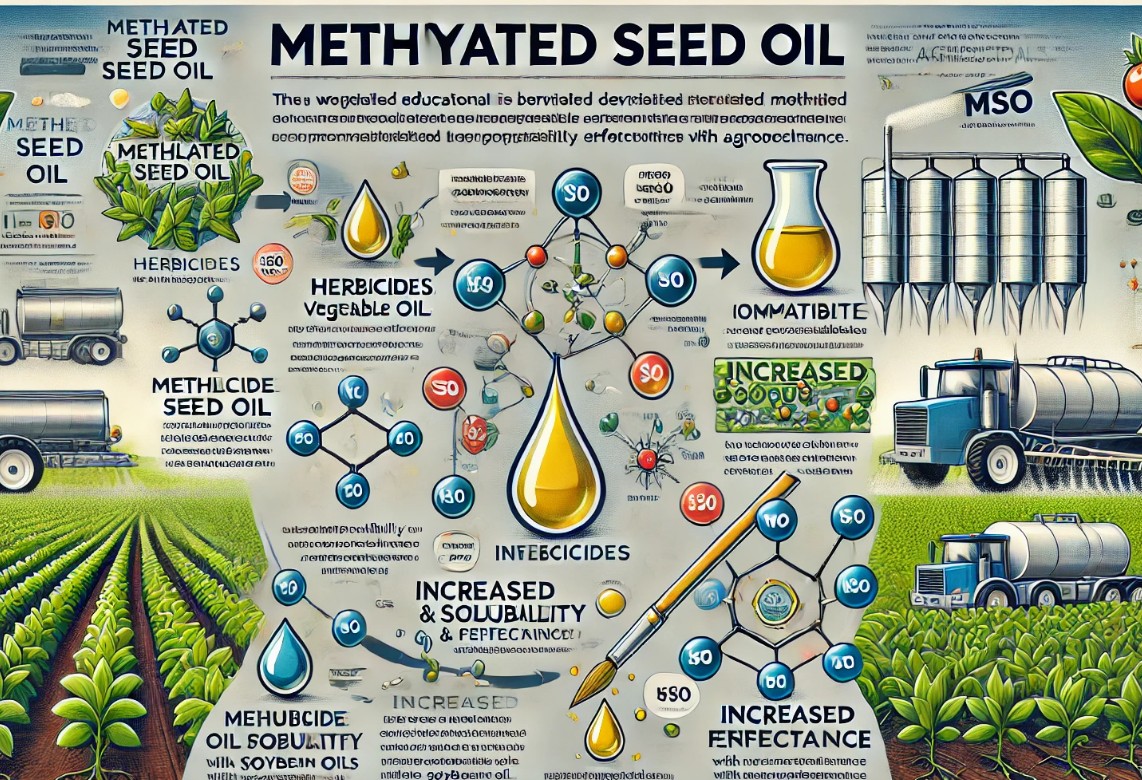What Is Methylated Seed Oil?
Methylated seed oil (MSO) is a specialized agricultural adjuvant derived from vegetable oils, typically soybean oil, that has been methylated through a chemical process to improve its compatibility and effectiveness with pesticides—especially herbicides, insecticides, and fungicides. This transformation increases the oil’s solubility, spreading ability, and penetration power when mixed with water-based agrochemicals.
In simpler terms, MSO enhances the delivery of crop protection chemicals to their target—whether it’s weeds, pests, or fungal diseases. Unlike traditional vegetable oils, methylated seed oil provides greater leaf coverage, better cuticle penetration, and faster absorption. These qualities make it a popular choice for post-emergent herbicide applications, particularly with hard-to-kill or resistant weeds.
The use of MSO has expanded rapidly in modern agriculture due to its ability to boost herbicide performance, reduce chemical waste, and lower the risk of application failure. Farmers and agronomists often choose MSO over conventional surfactants or oils for its superior efficacy in tough environmental conditions such as high heat, drought stress, or thick plant cuticles.
How Methylated Seed Oil Works in Agricultural Applications
To understand the function of methylated seed oil in agriculture, it’s important to break down its role as a penetrant, spreader, and activator. Once added to a spray tank mixture, MSO modifies the surface tension of the water solution, helping the herbicide adhere more effectively to the leaf surface.
Key mechanisms of action:
- Improved spray deposition: MSO ensures that droplets stick to the leaf rather than running off.
- Faster cuticle penetration: It breaks through the waxy barrier of plant leaves, allowing the herbicide to reach internal tissues more efficiently.
- Enhanced uptake and translocation: With better entry, the chemical moves within the plant more effectively.

This mechanism is especially crucial when using systemic herbicides, which must enter the plant’s vascular system to kill it effectively. Methylated seed oil significantly increases the success rate of these herbicides, particularly in post-emergent weed control scenarios.
Benefits of Using Methylated Seed Oil in Crop Management
When it comes to maximizing chemical performance in the field, methylated seed oil offers several critical benefits over other types of adjuvants.
Main advantages include:
- Superior penetration: Essential for difficult-to-control weeds with thick cuticles.
- Better environmental tolerance: Works well under hot, dry, or dusty conditions.
- Improved chemical uptake: Increases the herbicide’s bioavailability inside the plant.
- Reduced need for reapplication: Makes each spray more efficient and long-lasting.
- Versatility: Compatible with a wide range of herbicides, fungicides, and insecticides.
These benefits translate to cost savings, higher crop yields, and better pest and weed control—making MSO an indispensable part of modern farm management.
Common Crops and Situations Where MSO Is Used
Methylated seed oil is frequently used across a range of crops, including corn, soybeans, cotton, wheat, vegetables, and orchards. It’s most commonly applied during post-emergence weed control treatments, especially when dealing with glyphosate-resistant weeds.
Typical scenarios for MSO use:
- Spraying broadleaf herbicides on row crops
- Applying fungicides in orchard management
- Enhancing foliar absorption in drought-stressed crops
- Mixing with selective herbicides for targeted weed elimination
Due to its multi-functional role, MSO can be used across multiple growth stages and climatic conditions, making it a versatile and trusted adjuvant in both large-scale and specialty farming.
Choosing the Right Methylated Seed Oil Product
Not all MSO products are created equal. When selecting an adjuvant for your farm or spray program, you must consider formulation quality, crop compatibility, and herbicide label recommendations.
Key factors to evaluate:
- Concentration: Look for MSO with 100% active ingredients unless otherwise required.
- Emulsification: High-quality MSOs emulsify easily in spray tanks without separation.
- Additives: Some products include additional surfactants for enhanced spreadability.
Always follow pesticide label instructions carefully, as many herbicide manufacturers will specify whether MSO is required, optional, or incompatible with certain chemistries.
Recommended Usage Rates: Methylated Seed Oil Per Gallon
When it comes to application, knowing the proper methylated seed oil per gallon is critical for maximizing efficacy and avoiding crop injury. Usage rates can vary depending on the crop, chemical, and target pest or weed, but there are some general guidelines.
Common usage rates:
- 1 to 2 pints per acre, which translates to approximately 0.5 to 1 ounce per gallon of spray solution.
- For difficult weeds or under stress conditions, rates may increase to 1.5 ounces per gallon.
- Always refer to the herbicide label and MSO product label for exact mixing ratios.
Using the correct amount of MSO ensures consistent performance and minimizes environmental impact.
Methylated Seed Oil Surfactant: Dual-Functionality Explained
Many farmers and applicators ask whether methylated seed oil is also a surfactant—and the answer is yes, but with added benefits. A methylated seed oil surfactant combines the penetration power of oil with the surface tension-reducing ability of surfactants, giving it dual functionality.
MSO as a surfactant does the following:
- Spreads the solution across the leaf surface
- Improves adherence and reduces runoff
- Allows better movement of actives into plant tissue
While traditional nonionic surfactants (NIS) primarily focus on spreading, MSO penetrates and activates the chemical, making it superior in many tough scenarios.
Methylated Seed Oil vs Surfactant: What’s the Difference?
Understanding the distinction between methylated seed oil vs surfactant is essential for choosing the right adjuvant for your spray application.
Key differences:
- Surfactants reduce surface tension to enhance spreading but may lack penetration abilities.
- Methylated seed oils both spread and penetrate, delivering actives deeper into plant tissues.
When to use each:
- Use NIS (nonionic surfactants) for easy-to-control weeds or when label restrictions apply.
- Use MSO when targeting tough or resistant weeds, waxy-leafed plants, or stressed crops.
The choice depends on chemical compatibility, environmental conditions, and the target pest or plant structure.
Compatibility with Herbicides and Agrochemicals
Methylated seed oil is compatible with most post-emergent herbicides, including those based on glyphosate, dicamba, 2,4-D, and imazethapyr. However, it’s crucial to check specific herbicide labels for adjuvant recommendations or restrictions.
Compatibility tips:
- Conduct a jar test to ensure emulsification before full tank mixing.
- Avoid mixing MSO with herbicides that recommend only NIS or oils of a specific grade.
- Always add MSO last in the mixing order, after water, dry flowables, and liquid pesticides.
Proper mixing ensures uniform spray delivery and reduces risk of nozzle clogging or chemical separation.
Environmental Considerations and Safety Guidelines
As with any agricultural input, MSO should be used responsibly to minimize runoff, drift, and ecological impact. It’s considered biodegradable and derived from renewable resources, making it more environmentally friendly than petroleum-based oils.
Best practices:
- Use buffer zones near sensitive areas like waterways.
- Apply during low wind conditions to avoid drift.
- Clean spray equipment thoroughly after use to avoid cross-contamination.
Methylated seed oil is generally safe when used according to label instructions, but always wear proper personal protective equipment (PPE) during handling and mixing.
what is methylated seed oil? Clarifying the Concept
To reiterate, what is methylated seed oil? It’s a methylated form of vegetable oil used as an agricultural adjuvant to enhance the performance of herbicides and other pesticides. The methylation process improves oil solubility and absorption, giving it superior spreading and penetrating abilities.
It is not just oil—it’s a performance enhancer that plays a vital role in maximizing chemical efficacy, reducing waste, and improving yield.
Regulatory and Labeling Considerations
Because MSO interacts closely with pesticides, its use is often governed by EPA guidelines and state-level agricultural regulations. While it is not a restricted-use product in most jurisdictions, it should still be used in accordance with label directions.
Labeling tips:
- Check both the pesticide and MSO label for compatibility and approved usage rates.
- Ensure storage and transport comply with local agricultural chemical laws.
Compliance ensures legal application and environmental safety.
Summary: Why Methylated Seed Oil Is a Game Changer
In conclusion, methylated seed oil is a powerful, versatile, and essential adjuvant in modern crop production. Its ability to enhance herbicide performance, improve penetration, and work in extreme conditions makes it a preferred choice for farmers, agronomists, and applicators worldwide.
Whether you’re managing a large commercial operation or a specialty crop farm, incorporating MSO into your spray program can lead to more effective chemical use, healthier crops, and better ROI.
For More Update and Stories Visit: News Vista









